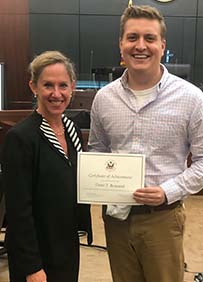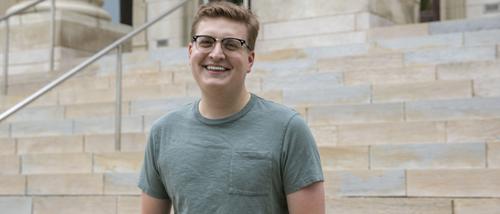When Southeast Missouri State University senior Drew Beussink began his undergraduate studies, he did not have a strong career trajectory in mind. Now with a political science degree and a passion for advocacy, he's heading to Yale Law School!
Four years and countless academically enriching opportunities later, the Cape Girardeau native will continue his educational journey in the hallowed halls of Yale Law School. Beussink, who double-majored in political science and economics, graduated from Southeast on May 14.
His decision to attend law school was solidified during the summer of 2020, when Beussink participated in the Federal Justice Fellowship, an intense, four-week summer pilot program to give fellows an understanding of the state and federal judicial systems and the U.S. Constitution, to receive an introduction to legal writing, and to observe district court cases and appellate arguments in the Eighth Circuit Court of Appeals.
"It was a great and unique opportunity for undergraduates, who usually do not have much access to this type of work,” Beussink said of the fellowship. “A lot of legal internships are reserved for law students, so it is hard for many to gain exposure to the industry and decide whether law school is a good idea. I am fortunate to have attended an institution with this opportunity.”
In addition to the fellowship, Beussink said two classes he took at Southeast were particularly interesting and memorable: constitutional law with Dr. Laura Hatcher, associate professor of political science, and judicial reasoning with Dr. Hamner Hill, chair of the Department of Political Science, Philosophy and Religion.
The experiences he gained at Southeast, in and out of classroom, have provided him a solid foundation as he prepares for law school, Beussink said.
“I’m thrilled to be moving on to the next stage of my life,” he said.
“ One thing that stood out to me was how happy and enthusiastic all of the students seemed. Everywhere, there was this sort of contagious energy among the students, and everyone was friendly and helpful. That really turned out to be true. Everyone is in it together and excited to help other people learn. ”

Hear More from Drew
Why did you choose Southeast?
My ties to the community were important to me, so I was drawn to attend a school close to home. I also had a ton of great recommendations from other students. Many of my friends had attended Southeast, and my mother is also an alumna and loved her time here, so she was influential as well. During my campus visit in high school, I was really sold on the school, and I knew that it was where I was meant to spend my four years in college.
What inspired you to pursue a career in political science?
I knew I was interested in some sort of public interest advocacy but wasn’t quite sure how to pursue it or how that could translate into a career. I was considering law school among many other options. I felt double majoring in economics and political science was the best way to explore my interests while preparing myself for a graduate education. It was during my first year here at Southeast that I began to see law school as the best path for me, and a law degree as the best way to advocate on behalf of issues and change that I care about.
How have your experiences at Southeast prepared you for a career after graduation?
I’m really grateful for the institutional support I have received here as well as some class/extracurricular experiences that have prepared me for law school. The faculty at Southeast have been amazing, they’re all so down-to-earth and approachable beyond belief. They always seem thrilled to have students in their office and are really committed to building a personal relationship with their students beyond the classroom. I know almost all my professors personally, which just isn’t something you see at many other state universities, and they’ve been incredibly helpful in formulating a career trajectory beyond college. It’s really amazing to be able to form close relationships with faculty who are experts in my field.
How would you describe SEMO?
I remember that as a freshman, I was kind of intimidated by faculty members. But even in my first year, they would contact me unprompted just to check in and offer help. They have a genuine interest in seeing students succeed and took the initiative to help out, even during my first year. I have had different professors who have offered personal tutoring sessions, who have reached out to review exam answers, and have offered to review essay drafts before submission. They really seem committed to creating a truly collaborative learning environment. Nothing ever felt impossible or out-of-reach while I was a student at Southeast. Something else that really stood out was our campus’s reaction to COVID-19. It was just a novel time for all of us, and I really appreciated how the faculty made such an effort to make the transition to online learning as seamless as possible. We didn’t even skip a beat — we just saw the circumstances around us and adapted our learning around that. To me, that perfectly exemplifies Southeast's spirit.
Do you have any other personal or career goals after graduation?
My primary interest lies in the realm of appellate advocacy/impact litigation, but I have a very wide range of interests right now. I want to use the court system to create wider, systemic change. My decision to go to law school (and Southeast, in many ways) was rooted largely in my ties to the local community, so issues affecting rural communities are especially interesting to me. This includes privacy rights (especially protecting vulnerable internet users from overly invasive technology companies) and voting rights, as well as holding local officials accountable for corruption and just the general goal of making the legal system and government more effective. Protecting the civil liberties (like free speech and free exercise) of rural residents is also something that is important to me. I’m also potentially interested in working as a federal prosecutor with white collar criminal cases or in pattern/practice investigations.
